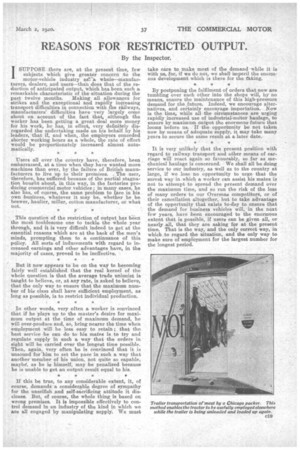REASONS FOR RESTRICTED OUTPUT.
Page 9

If you've noticed an error in this article please click here to report it so we can fix it.
By the Inspector.
I SUPPOSE there are, at the present time, few subjects which give greater concern to the motor-vehicle industry ar'a whole—ma,nufae . turers, dealers, and users----than does that of the reduction of anticipated output, which has been such a remarkable characteristic of the situation during the past twelve months. Making all allowances for strikes and the exceptional and rapidly increasing transport difficulties in connection -with the railways, manufacturers' difficulties have -very largely come about on account • of the fact that, although the worker has been getting a great deal more money for his work, he has in effect, very definitely disregarded the undertaking made on his behalf by his leaders, that if, and when, the employers conceded shorter working hours as a whole, the rate of effort would be proportionately increased almost auto matically.
Users all over the country have, therefore, been , embarrassed, at a time when they have wanted more machines than ever, by the failure of British manufacturers to live up to their prdmiees. :The user, therefore, has suffered because of the partial stagnation bought about, in this way, in the factories pros ducing commercial motor vehicles; in many cases, he also has, of course, the same problem to face in his own business, whatever it may be. whether be be brewer, haulier, miller, cotton manufacturer, or what not.
This question of the restriction of Output has ;la-Jen the most toublesome one to tackle the whole year through, and it is very difficult indeed to get at the essential reasons which are at the back of the men's minds, prompting them to a continuance of this policy. All sorts of inducements with regard to increased earnings and other advantages have, in the majority of cases, proved to be ineffective.
I3ut it now appears to be on the way to becoming fairly well established that the real kernel of the whole question is that the average trade unionist is taught to believe, or, at any rate, is asked to believe, that the only way to ensure that the maximum number of hie class shall have sufficient employment, as long as possible, is to restrict individual production.
In other words, very often a worker is convinced that if he plays up to the master's desire for maximum output at the time of maximum demand, he will over-produce and, so, bring nearer the time when employment will be less easy to retain ; that the best service he can do to his mates is to try and regulate supply in such a way that the orders in sight will be carried over the longest time possible. Then, again, very often he is convinced that it is unsound for'him to set the pace in such a way that another member of his union, not quite so capable, maybe, as he is himself, may be penalized because he is unable to get an output result equal to his.
If this be true, to any considerable extent, it, of course, demands a considerable degree of sympathy for the unselfish and self-sacrificing attitude it disclose. But, of course, the whole thing is based on wrong premises. It is impossible effectively to control demand in an industry of the kind in which we are all engaged by manipulating supply. We must take care to make most of the demand .while it is with us, for, if we do not, we shall imperil the enormous development which is there for the faking.
By postponing the fulfilment of orders that now are tumbling over each other into the shops will, by no means ensure the Maintenance of this high-pressure demand for the future. Indeed, we encourage alternatives, and certainly encourage importation. Now Is. the time, while all the circumstances are urging rapidly increased use of ind-ustriaknotor haulage' to ensure by maximum output the enormous future that looms before us. If the opportunity be not taken now by means of adequate supply, it may take many years to secure the same result at a later date.
It is very unlikely that the present position with regard to railway transport and other means of carriage will react again so favourably, so far as mechanical haulage is concerned. We shall all be doing service to our industry, as well as to the country at large, if we lose no opportunity to urge that the surest way in which a worker can assist his mates is not to attempt to spread the present demand over the maximum time, and so run the risk of the loss of many orders to our Overseas competitors, or of their cancellation altogether, but to take advantage of the opportunity that exists to-day to ensure that the demand for business vehicles will, in the next few years, have been encouraged to the enormous extent that is possible, if users can be given all, or nearly all, that they are asking for at the present time. That is the way, and the only correct way, in which to regard the situation, and the only way to make sure of employment for the largest number for the longest period.


































